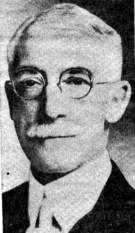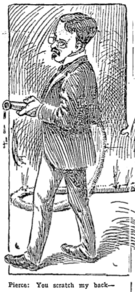William H. Pierce
William Henry[1] Pierce, who went by William H. Pierce, (1859–1939) was a founder of Pierce Brothers Mortuary in Southern California, which at the time of his death was the second-largest funeral business in the nation. He was also a member of the Los Angeles City Council and that city's Planning Commission.

Biography
Pierce was born on December 28, 1859, in Delaware County, New York, the son of James Washington Pierce of Dutchess County and Francis C. Clark of Delaware County. His brothers were C.W., Herbert and Fred Pierce, and he had a sister, Catherine (later Wheat). He was married on April 15, 1886, to Mary Jane Newton of Saybrook, Connecticut. They had three children, Sterling N., Gertrude (Mrs. Hyalmar Johnson) and Helen Mary (Mrs. Harry Hum).[2][3]
He attended public schools in Delaware County and graduated from Walton Academy in Walton, New York. At the age of nineteen, he was a schoolteacher for a year, then emigrated in 1880 to Sacramento, California, where he joined a brother in the grocery business. The next year he spent with another brother in Sierra Madre, California, and then ran a general store for a year at Tuolumne Hill, Calaveras County.[2]
Moving to Los Angeles in 1885, Pierce engaged with both brothers in a furniture store and livery stable business on the Los Angeles Plaza. Later he took on raising grain and hay on Mission Road near the eastern city limits, and in 1902 all three began a mortuary business under the name of Pierce Brothers & Company. It became the second-largest mortuary in the United States.[2][3]
In 1934 he owned three farms of more than 200 acres in the San Joaquin Valley and Riverside County, and he listed his hobbies as golf, farming and viticulture (grape cultivation). He was a member of the Masons, Woodmen of the World, Elks Lodge, California Country Club, City Club and Commercial Club. He was an official of the First Unitarian Church, Los Angeles, and a Republican. He was a founder of the Los Angeles Chamber of Commerce.[2][3]
Pierce, whose address was 2118 South Hobart Boulevard in Harvard Heights,[4] died on February 24, 1939, at Chase Sanitarium after an illness of "little more than a week." It was said his death was "hastened by grief over the loss of his son," Dr. Sterling Pierce, former chief of staff of California Lutheran Hospital, who was killed three months previous in a San Diego traffic accident.[3]
Funeral services for William Pierce were held at the First Unitarian Church, and burial was on his ranch property in Hemet, California.[5] He bequeathed most of his estate to his family, with $500 going to the First Unitarian Church.[6]
Public service
City Council

In 1898 Pierce was elected to the City Council from the 1st Ward in Lincoln Heights. He was reelected and served until 1903. His interests centered on the problems of the city's water supply, and he took part in the successful endeavor to establish a municipal water system, taking over control from private companies.[2]
Commissions
Pierce helped organize and was president of the City Planning Commission from 1920 to 1922. The 51-member group was "an outgrowth of the City Planning Association formed primarily to prepare a program of civic improvements to create employment for returned soldiers of the World War." He was next a member of a new planning commission until 1925.[2] He was also an organizer and president for one term of the city Traffic Commission.[3]
References
- ↑
- Chronological Record of Los Angeles City Officials: 1850—1938, Compiled under Direction of Municipal Reference Library City Hall, Los Angeles March 1938 (Reprinted 1966)
- ↑ 2.0 2.1 2.2 2.3 2.4 2.5 Los Angeles Public Library reference file
- ↑ 3.0 3.1 3.2 3.3 3.4 "W.H. Pierce, Mortuary Founder, Dies," Hollywood Citizen-News, February 24, 1939
- ↑ Location of the Pierce residence
- ↑ "Death Takes W.H. Pierce, Civic Leader," Los Angeles Examiner, February 24, 1939
- ↑ "Pierce Estate Goes to Kin," Los Angeles Times, March 12, 1939, page 8 Library card required.
| Preceded by George W. Stockwell |
Los Angeles City Council 1st Ward 1898–1902 |
Succeeded by Owen McAleer |